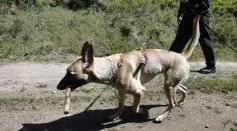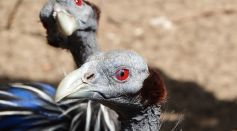Tags: Animal behavior

Wireless Sensor Revolutionizes Neuroscience, Provides Breakthrough Understanding of Mouse Behavior and Physiology

500-Million-Year-Old Crustacean Trace Fossil Reveals Life Forms in Tidal Settings, Shows Ancient Animal Behavior Before Settling on Land

Blinking Slowly Could Be an Effective Way To Communicate With Cats, Study Reveals

3-Legged Alligator Spotted Tenderly Caring for Her Young Showing That Crocodiles Are Misunderstood Reptiles

Complex Decision-Making Observed in Worms; Accounts Ability of Smaller Life Forms With Lesser Brain Cells

Hippopotamuses Spray Poop When They Recognize Sounds Both of Friends and Rivals

Gold-Mantled Ground Squirrels Personalities Similar to Humans Like Being Shy, Social, or Bold That Is Beneficial for Ecosystem
Manipulative Animals: How Some Species Use Blackmail

Kangaroos Use Unique Gaze to ‘Talk’ to Humans

Risky Animal Behavior Influenced and Triggered by Hunger

Retired Military Dog Set to Receive Dickin Medal | How Does Positive Training for Dogs Work Anyway?

Vulturine Guineafowl Exhibits Behavior Reflective of a Multilevel Society—Something Uncommon to Birds
You Dirty Rat? Rats Show Empathy, Save Each Other From Drowning
Most Popular

Why Stars Twinkle: Flickering Explained by Atmospheric Turbulence and Light Distortion

The Role of Materials Science in Engineering: How Modern Engineering Materials Drive Innovation

Tornadoes vs. Waterspouts vs. Dust Devils: Key Differences and Vortex Types Explained

Climate Adaptation Strategies Explained: How Societies Respond to Climate Change





